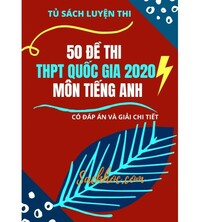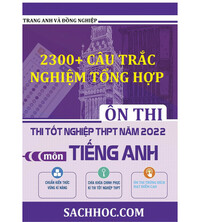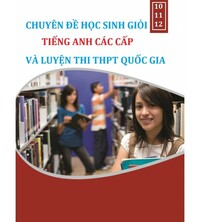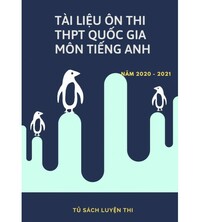Đề thi Tiếng Anh THPT Quốc Gia 2019 có đáp án
Đề thi thử tốt nghiệp THPT 2019 môn Tiếng Anh có đáp án nằm trong bộ đề thi THPT Quốc Gia môn Tiếng Anh năm 2019 do Tìm Đáp Án sưu tầm và đăng tải. Đề kiểm tra Tiếng Anh gồm 50 câu hỏi trắc nghiệm Tiếng Anh khác nhau được biên tập bám sát chương trình học THPT giúp học sinh lớp 12 ôn tập kiến thức đã học hiệu quả.
Xem thêm: Đáp án đề thi THPT Quốc gia 2019 môn Tiếng Anh HOT
Mark the letter A, B, C, or D on your answer sheet to indicate the word whose underlined part differs from the other three in pronunciation in each of the following questions.
Question 1. A. objection B. obey C. impose D. forbid
Question 2. A. sounds B. obstacles C. situations D. secrets
Mark the letter A, B, C, or D on your answer sheet to indicate the word that differs from the other three in the position of primary stress in each of the following questions.
Question 3. A. description B. understand C. inspector D. adoption
Question 4. A. studious B. century C. well-done D. similar
Mark the letter A, B, C, or D on your answer sheet to indicate the word(s) CLOSEST in meaning to the underlined word(s) in each of the following questions.
Question 5. In spite of poverty and dreaful conditions, they still manage to keep their self-respect
A. self-reliant B. self-restraint C. self-esteem D. self-assured
Question 6. Scientists hope that this new drug will be a major breakthrough in the fight against AIDS.
A. new cure B. important therapy C. sudden remedy D. dramatic development
Mark the letter A, B, C, or D on your answer sheet to indicate the word(s) OPPOSITE in meaning to the underlined word(s) in each of the following questions.
Question 7. This reference book is essential material for us to prepare for the next assignment.
A. Necessary B. dispensable C. vital D. fundamental
Question 8. Most students in our country are interested in pursuing higher education to get bachelor’s degree.
A. following giving up C. trying D. interrupting
Mark the letter A, B, C, or D on your answer sheet to indicate the underlined part that needs correction in each of the following questions.
Question 9. Keith had so interesting (A) and creative plans (B) that everyone wanted (C) to work on (D) his committee.
Question 10. The purpose of the United Nations, broadly speaking (A), is to maintain peace and security (B) and encourage (C) respect for human rights (D).
Question 11. Although (A) the quantity was (B) small, we had supplied enough (C) to finish the (D) experiment.
Mark the letter A, B, C, or D on your answer sheet to indicate the most suitable response to complete each of the following exchanges.
Question 12. Peter is going on vacation next week. Today, he drops in on Tom before he travels to American.
Peter: “Where do you suggest I stay?”
- Tom: “_______”
A. Let’s stay at the Hilton! B. I suggest you to Hilton.
C. I prefer the Hilton. D. I recommend the Hilton.
Question 13. Sarah and Kathy are talking about bad habits of children.
Sarah: “Children under ten shouldn’t stay up late to play computer games”
- Kathy: “_______”
A. You are absolute right. B. Surely, they shouldn’t.
C. Yes, I share your opinion. D. I don’t quite agree with you.
Mark the letter A, B, C, or D on your answer sheet to indicate the correct answer to each of the following questions.
Question 14. _______ all the hard work they put in, the students got good exam results.
A. As a result of B. In compared with C. According to D. In addition to
Question 15. What a (n) _______ behaviour! He went straight into the line.
A. shame B. shameful C. ashamed D. shameless
Question 16. _______, he could not lift the trap door.
A. As he was strong B. Strong as was he
C. As strong he was D. Strong as he was
Question 17. It is necessary to be careful _______ your career.
A. when choosing B. when you will choose
C. when you have chosen D. when you chose
Question 18. Species become extinct or endangered for _______ number of reasons, but _______ primary cause is the destruction of habitat by human activities.
A. a/a B. a/the C. the/a D. the/the
Question 19. I _______ in trouble now if I had listened to you in the first place.
A. Won’t be B. wouldn’t be C. am not D. wouldn’t have been
Question 20. We all know that it is important _______ medical directions to be understood clearly.
A. with B. for C. to D. in
Question 21. I _______ a better job, and I am going to accept it.
A. was offering B. have been offered
C. was going to be offered D. am offering
Question 22. That honest man always speaks _______ is true even if it is bitter.
A. that it B. that C. what D. which
Question 23. He is doing very badly but he tries to _______ appearances.
A. hold on B. stick to C. keep up D. make out
Question 24. Unlike the other Asian states, Singapore has _______ raw materials.
A. hardly any B. any hardly C. hardly no D. hardly some
Question 25. Of the two new secretaries, one is competent and _______ is not.
A. another B. other C. the other D. the second
Mark the letter A, B, C, or D on your answer sheet to indicate the sentence that is closest in meaning to each of the following questions.
Question 26. Because I hadn’t heard the weather forecast, I was surprised to see the heavy rain.
A. Not having heard the weather forecast, I was surprised by the heavy rain.
B. The heavy rain caused me surprising because I hadn’t heard the weather forecast.
C. It was raining heavily, so I was surprised by the weather.
D. The weather forecast prevented me from knowing about the heavy rain.
Question 27. Ann’s parents said to her, “You are too young to get married.”
A. Ann’s parents said that she can’t get married at quite a young age.
B. Ann’s parents stopped her from getting married at quite a young age.
C. Ann’s parents said that she is so young that she can’t get married.
D. Ann’s parents advised her to get married.
Question 28. Payment must be made at the time of booking.
A You must pay before you book B. You are not allowed to pay when you book.
C. You must pay when you book. D. Payment in advance is acceptable if you want to book.
Mark the letter A, B, C, or D on your answer sheet to indicate the correct answer to complete each of the following sentences.
Question 29. I spent one hour _______.
A. trying to find the answer to the question
B. to try to find the answer to the question
C. trying to find the answer for the question
D. to try to find the answer for the question
Question 30. Modern women now work outside the home .
A. because they want to be economically independent
B. in spite of their economical independence
C. although they are economically independent
D. so that they are economically dependent
Read the following passage and mark the letter A, B, C, or D on your answer sheet to indicate the correct word or phrase that best fits each of the numbered blanks from 31 to 35.
SUCCESS
We tend to assume that people like Shakespeare or Darwin owe their success (31) _______ their genius. In his new book, Outliers, Malcolm Gladwell suggests that the truth may be more complex. Of course, all successful people are bound to have some natural (32) _______. But the true (33) _______of success are most probably hard work, opportunity, and the environment you grow up in.
You need about 10.000 hours of practice before you get really good at something. Mozart’s early work was certainly not great or (34) _______ . By the time he composed his first true masterpieces, he must have spent about ten years composing concertos.
But hard work is not enough, you have to get your chance. Most Silicon Valley tycoons, like Bill Gates or Steve Jobs, were born around 1955. When the personal computer revolution came twenty years later, they were at a(n) (35) _______ age to lead it.
Question 31. A. about B. for C. to D. on
Question 32. A. presents B. prizes C. opportunities D. gifts
Question 33. A. ingredients B. recipes C. elements D. details
Question 34. A. different B. original C. ordinary D. strange
Question 35. A. average B. earlier C. perfect D. true
Read the following passage and mark the letter A, B, C, or D on your answer sheet to indicate the correct answer to each of the questions from 36 to 42.
Philadelphia is a city known for many things. It is where the Declaration of Independence was signed in 1776, and it was also the first capital of the United States. But one fact about Philadelphia is not so well-known: it is home to nearly 3,000 murals painted on the sides of homes and buildings around the city. In fact, it is said that Philadelphia has more murals than any other city in the world, with the exception of Rome. How did this come to be?
More than 20 years ago, a New Jersey artist named Jane Golden started a program pairing troubled youth with artists to paint murals on a few buildings around the city. From this small project, something magical happened. The young people involved helped to create magnificent pieces of art, but there were other, perhaps more important benefits. The young people learned to collaborate and get along with many different kinds of people during the various steps required to paint and design a mural. They learned to be responsible, because they needed to follow a schedule to make sure the murals were completed. They also learned to take pride in their community. It is hard for any resident to see the spectacular designs and not feel proud to be a part of Philadelphia.
Take a walk around some of the poorest neighborhoods in Philadelphia, neighborhoods full of broken windows and littered front steps, and you will find beautiful works of art on the sides and fronts of buildings. Of course the murals are not just in poor neighborhoods, but more affluent ones as well. Special buses take tourists to different parts of the city to see the various murals, which range from huge portraits of historical heroes, to cityscapes, to scenes depicting the diverse ethnic groups that call Philadelphia home.
As a result of its success, the mural program created by Jane Golden has now become the nation’s largest public art program and a model for other cities throughout the country seeking to help troubled youth.
Question 36. The main focus of the passage is _______.
A. an art program designed to help troubled youth
B. the many tourists who come to Philadelphia to see murals
C. the reasons why Philadelphia is a unique city
D. how Jane Golden came up with the idea to start a mural program
Question 37. As used in paragraph 1, the phrase “it is said” suggests that the author is _______.
A. knowingly misleading the reader
B. using a quote from someone else
C. referring to something that is widely believed, but may be untrue
D. referring to something that he or she does not personally believe
Question 38. According to the passage, the murals in Philadelphia _______.
I. draw tourists who want to see them
II. instill responsibility and pride in the people who paint them
III. are solely designed by the youth who paint them
A. I only B. I and II only C. II and III only D. I, II, and III
Question 39. As used in paragraph 3, which is the best definition of “affluent”?
A. popular B. clean C. well-known D. wealthy
Question 40. Based on information in the passage, the author most likely believes that _______.
A. there are too many murals in Philadelphia
B. the mural program was an inspirational idea
C. all troubled youth should learn how to paint
D. every city in the country should adopt the mural program
Question 41. Based on information in the passage, it can be inferred that the author believes the two best reasons for other cities to adopt the mural program are to _______.
A. beautify their city and draw tourists
B. help troubled youth and beautify their city
C. have as many murals as Philadelphia and help troubled youth
D. draw tourists and surpass Philadelphia in terms of number of murals
Question 42. In order to make this passage more engaging to readers, the author could have included _______.
I. a brief history of Philadelphia
II. pictures of some of the murals
III. an interview with a program muralist
A. I only B. I and II only C. II and III only D. I, II, and III
Read the following passage and mark the letter A, B, C, or D on your answer sheet to indicate the correct answer to each of the questions from 43 to 50.
GETTING CLOSER TO NATURE AT NATIONAL PARKS
In modern times, we seem to be getting more separate from nature with each passing day. Most of us spend the majority of our time indoors, typing away at computers and fiddling with digital devices. All the while, we are destroying the planet’s natural beauty by cutting down forests and building cities in their place. In an effort to preserve nature for future generations, national parks were created.
The primary function of national parks is conservation. In many cases, it is a matter of national pride for countries to protect their indigenous species. Although several nations considered opening national parks, the US was the first country to officially do so when Yellowstone Park opened in 1872. This designation made the federal government responsible for taking care of the territory. Soon after, national parks started to open in Australia, New Zealand, Europe, and eventually across the globe. Today, almost 100 countries have established their own national parks. In total, there are over 6,500 worldwide.
There are several incredible national parks that have a lot to offer. Kruger National Park in South Africa at 19,633 square kilometers is one of the largest game reserves. Tourists can go on safari and witness elephants, rhinoceroses, lions, and several other large mammals in their natural environments. At 75,000 square miles, the Northeast Greenland National Park is the world’s largest. In fact, it is larger than all but 30 countries in the world.
Despite differences in names, location, and rules, most natural parks have certain traits in common. For one, they are usually open to visitors throughout the year. Those who come to the park can take part in a wide scope of outdoor activities including hiking, camping, cycling, bird watching, and fishing. Other options may include horseback riding, rafting, or scuba diving if the territory is suitable. In most places, visitors are encouraged not to feed the animals. The purpose for this law is twofold: to protect the animals as well as those who might feed them. Animals also have strict dietary needs, so feeding them exotic foods could make them sick. Feeding wild animals could also cause them to aggressively pester humans they encounter in the future for food. However, as long as you follow the rules, you are assured of having a great time at whichever national park you visit.
Question 43. What does the first paragraph mainly talk about?
A. What people will likely see when they visit a national park.
B. How national parks will probably be different in the future.
C. A few things you will likely see if you go to visit a national park.
D. Some reasons why national parks are necessary.
Question 44. What is the main idea of the second paragraph?
A. The establishment of national parks
B. The main purposes of national parks
C. Some interesting facts about national parks
D. The first American national parks
Question 45. Which of the following people would probably be most interested in visiting Kruger National Park?
A. Someone who is interested in hiking
B. Someone who is interested in rare plants
C. Someone who likes observing large creatures
D. Someone who needs to adopt an animal
Question 46. The word “indigenous’' in paragraph 2 is closest in meaning to _______.
A. rare B. native C. large D. extinct
Question 47. Which of these activities would probably NOT be featured at a national park?
A. Flying lessons B. Rafting C. Mountain climbing D. Canoeing
Question 48. Which of the following is NOT true about national parks?
A. They lies at locations with different traits.
B. They offer a variety of activities to visitors.
C. There are rules against feeding animals by tourists.
D. They have been established to avoid disasters.
Question 49. The word “they” in the last paragraph refers to _______.
A. visitors B. guards C. animals D. exotic foods
Question 50. What can be inferred from the passage?
A. National parks were established in Britain earlier than those in the US.
B. National parks are not open to visitors in winter.
C. The Northeast Greenland National Park is only smaller than 30 countries in the world.
D. National parks in the US are under the control of the state authorities.
ANSWER KEY
1 C 2 D 3 B 4 C 5 C 6 D 7 B 8 B 9 A 10 C
11 C 12 D 13 B (A or C may be acceptable) 14 A 15 B 16 D 17 A
18 B 19 B 20 B 21 B 22 C 23 C 24 A 25 C 26 A 27 B 28 C 29 A 30 A
31 C 32 D 33 A 34 B 35 C 36 A 37 C 38 B 39 D 40 B
41 B 42 B 43 D 44 C 45 C 46 B 47 A 48 D 49 C 50 C
Trên đây là toàn bộ nội dung của Đề thi thử THPT Quốc Gia 2019 môn Anh có đáp án. Mời bạn đọc tham khảo thêm nhiều tài liệu ôn thi THPT Quốc Gia các môn khác được cập nhật liên tục trên Tìm Đáp Án như: Thi thpt Quốc gia môn Tiếng Anh 2019, Thi thpt Quốc gia môn Toán 2019, Thi thpt Quốc gia môn Văn 2019 ,...







